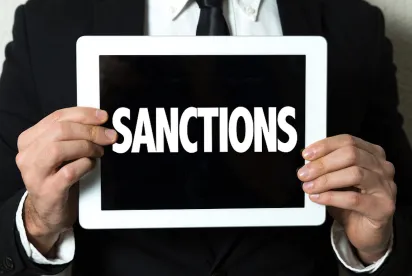On 24 and 25 February 2022, the European Union (EU) imposed additional extensive sanctions on Russia—and new ones on Belarus—in response to the Russian invasion of Ukraine. In this On the Subject, our trade and sanctions team provides an update on the newly imposed sanctions as well as a brief overview of existing EU sanctions against Russia. For more information on the global response to Russia’s invasion of Ukraine, please see our previous alert here.
IN-DEPTH
Further Financial and Economic Restrictions on Russia
On 25 February 2022, the European Union adopted Regulation (EU) 2022/328. Regulation (EU) 2022/328 amends Regulation (EU) 833/2014 and expands the existing financial and economic restrictions, imposing wide-ranging sanctions aimed at cutting off Russian access to the most important capital markets and economic restrictions targeting the Russian defence, energy and aviation sectors. Specifically, the new measures include:
-
A prohibition of listing and provision of services in relation to shares of 12 additional Russian state-owned entities (Alfa Bank, Bank Otkritie, Bank Rossiya, Promsvyazbank, Almaz-Antey, Kamaz, Novorossiysk Commercial Sea Port, Rostec (Russian Technologies State Corporation), Russian Railways, JSC PO Sevmash, Sovcomflot and United Shipbuilding Corporation) on EU trading venues;
-
A prohibition on the provision of financial assistance for trade with, or investment in, Russia, with limited exceptions such as in relation to financial commitments established before 26 February 2022; financial assistance for up to €10,000,000 to EU small and medium-sized enterprises (SMEs); or financing trade in food, agricultural, medical or humanitarian purposes;
-
A ban on the acceptance of deposits exceeding a total value of €100,000 from Russian nationals or residents, subject to certain exceptions. Without prejudice to the rules on reporting, confidentiality and professional secrecy, credit institutions will also be required to supply competent Member State authorities with a list of all deposits exceeding €100,000 held by Russian nationals or residents by 27 May 2022 and provide updates on the amounts of such deposits every 12 months;
-
A prohibition of holding accounts of Russian clients by the EU Central Securities Depositories;
-
A ban on selling Euro-denominated securities issued after 12 April 2022 to Russian individual or entities;
-
Further restrictions on the exports of dual-use goods and technologies and on the provision of related services, as well as restrictions on exports of certain goods and technologies which might contribute to Russia’s technological enhancement of its defence and security sectors;
-
A prohibition on the sale, supply, transfer or export to Russia of specific goods and technologies for use in oil refining, together with restrictions on the provision of related services. These prohibitions will not apply to the execution until 27 May 2022 of contracts concluded before 26 February 2022 (as well as ancillary contracts necessary for the execution of such contracts); and
-
An export ban on goods and technologies suited for use in the aviation and space industry, and prohibition on the provision of technical and financial assistance, insurance, reinsurance and maintenance services in relation to those goods and technologies. However, these prohibitions will not apply to the execution until 28 March 2022 of contracts for the provision of certain goods concluded before 26 February 2022 (as well as ancillary contracts necessary for the execution of such contracts).
Targeted Sanctions on Russian Entities and Individuals
The European Union adopted Regulation (EU) 2022/330 and Regulation (EU) 2022/332, amending Regulation (EU) 269/2014 and imposing individual sanctions targeting:
-
Russian President Vladimir Putin and the Minister of Foreign Affairs Sergei Lavrov;
-
Members of the National Security Council of the Russian Federation who supported Russia’s immediate recognition of the two non-government-controlled areas of the Donetsk and Luhansk oblasts of Ukraine as independent entities; and
-
The remaining members of the Russian State Duma who were not already subject to sanctions.
The targeted sanctions freeze the assets of listed individuals and prohibit EU operators from making economic resources available to or for the benefit of listed persons. The prohibitions are broad in scope; the European Commission issued an opinion clarifying that making payments to third-country intermediaries for goods originating from a non-listed entity that is controlled by a listed individual can be considered as making funds indirectly available to the designated person.
All sanctions announced on 25 February 2022 have been be published in the Official Journal of the European Union and have taken immediate effect.
Further Developments
In a joint press statement on 26 February 2022, the leaders of the European Commission, France, Germany, Italy, the United Kingdom, Canada and the United States announced their intention to implement additional restrictive economic measures, including removing selected Russian banks from the SWIFT messaging system. This would result in Russian banks being disconnected from the international financial system, harming their ability to operate globally.
European Sanctions Against Belarus
On 24 February 2022, the European Union adopted Regulation (EU) 2022/300, which amends Regulation (EU) 765/2006. The restrictive measures set out therein include a visa ban and asset freezes of President Alexander Lukashenko and certain officials of Belarus. Likewise, on 24 February 2022, the European Council adopted Council Decision (CFSP) 2022/307, which amends Decision 2012/642/CFSP of 15 October 2012. This Decision included:
-
A ban of sale, supply, transfer or export of arms and related material of all types;
-
An EU-wide travel ban for the listed individuals; and
-
An asset freeze and a prohibition of making funds available to the listed individuals and entities.
The Council decided that the targeted sanctions detailed above should be renewed until 28 February 2023. Regulation (EU) 2022/300 and Council Decision (CFSP) 2022/307 are not direct reactions to Belarus’ involvement in Russia’s invasion of Ukraine. Nevertheless, they must be considered in the current situation.
On 17 February 2022, the European Union adopted Regulation (EU) 2022/212, which amends Regulation (EU) 765/2006 concerning restrictive measures in respect of Belarus. Originally, this regulation was issued in response to the forced landing of a Ryanair flight in Minsk on 23 May 2021 for the arrest of journalist Raman Pratasevich by Belarusian authorities. The decree is thus not a direct reaction to Belarus’ involvement in Russia’s invasion of Ukraine. Nevertheless, it must be considered in the current situation.
The financial and economic sanctions against Belarus set out by Regulation (EU) 765/2006 (as amended) include:
-
A prohibition to sell, supply, transfer or export—directly or indirectly—equipment, technology or software primarily intended for the monitoring or interception of internet and telephone communications, as well as dual-use goods and technology for military use, to certain persons, entities or bodies in Belarus;
-
A prohibition to purchase, import or transfer petroleum products and gaseous hydrocarbon products directly or indirectly from Belarus;
-
A restriction of access to the EU-capital markets; and
-
A prohibition on providing insurance and reinsurance to the Belarusian government and Belarusian public institutions and agencies.






 />i
/>i

